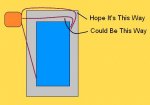- Apr 23, 2008
- 342
Hey folks,
I've got a leak in one of my return lines (the deep end line).
I've got about 4 feet of concrete surrounding the pool. Outside of the concrete is all dirt. My hope is that when they laid the piping for the pool, they ran it under the dirt as much as possible and tried to avoid the concrete, so that if there ever was a leak, you might be able to repair it without tearing up the whole deck.
So, two questions:
1) Do they often do that (i.e. go out of the way to avoid the concrete)?
2) Is there a way to determine where the pipe is laid down (without tearing up the concrete or the surrounding lawn)? I can't think of anyway, but I can't be the first person that needs to figure this out, so...
Here's a picture of what I am talking about:
I've got a leak in one of my return lines (the deep end line).
I've got about 4 feet of concrete surrounding the pool. Outside of the concrete is all dirt. My hope is that when they laid the piping for the pool, they ran it under the dirt as much as possible and tried to avoid the concrete, so that if there ever was a leak, you might be able to repair it without tearing up the whole deck.
So, two questions:
1) Do they often do that (i.e. go out of the way to avoid the concrete)?
2) Is there a way to determine where the pipe is laid down (without tearing up the concrete or the surrounding lawn)? I can't think of anyway, but I can't be the first person that needs to figure this out, so...
Here's a picture of what I am talking about:





 I've seen it on tv so I know what you're talking about
I've seen it on tv so I know what you're talking about